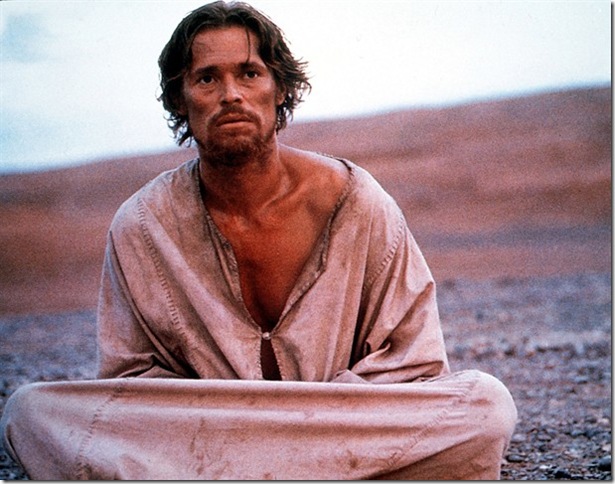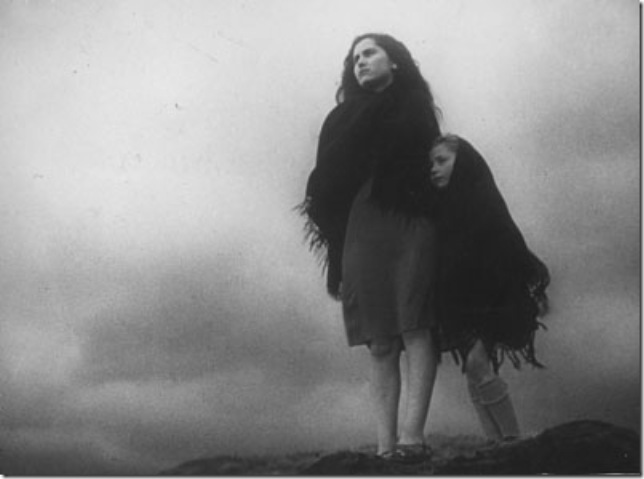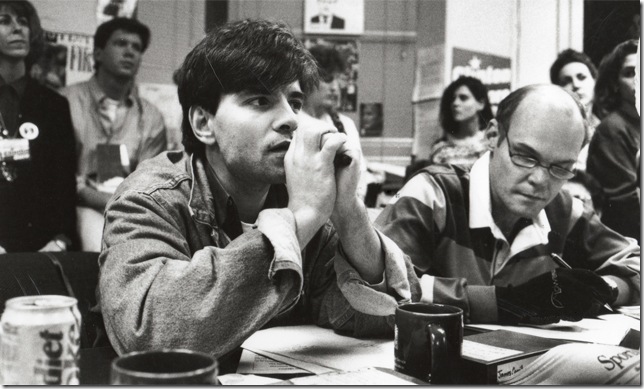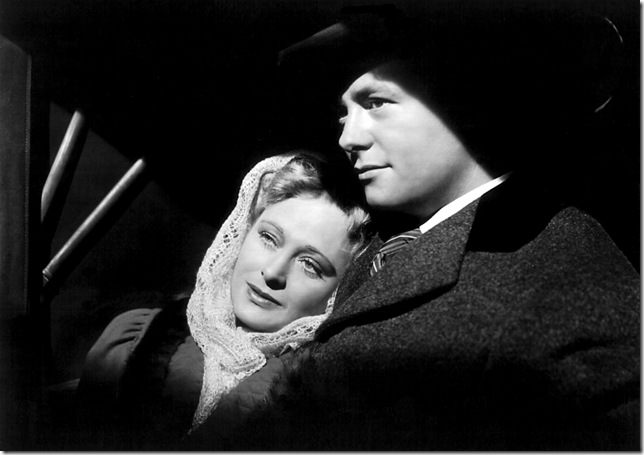There may be no better way to tee off an evangelical conservative than to emblazon the bumper of your Prius with one of those “Jesus was a liberal” stickers. The politicization of the Son of God is a perennially popular topic, with both sides picking and choosing to support their theses.
But in Martin Scorsese’s still-controversial The Last Temptation of Christ (Blu-ray, Criterion, $27.99), Jesus the carpenter is the anti-Joe the Plumber, a miracle-working messiah of the 99 percent. We see him preaching a belief system built on love, putting an end to Old Testament brutalities like stoning and living a humanist, peacenik theology, despite the seeming impracticality of “turn the other cheek.” Most importantly for today’s political landscape, he runs out the money-lenders, upending their makeshift marketplace and, yes, spreading the wealth.
The Last Temptation of Christ is one of the most polarizing films of the past three decades. It inspired a bombing in a French movie theater and is still banned in two countries. For a while, Blockbuster, ever one to shy away from films anyone deems offensive, refused to stock it. Religious leaders (many of whom have not seen the film, which should negate their comments) have taken issue with the titular “last temptation” sequence, in which Jesus is lured into living a normal, humane life, climbing down from the cross and eschewing his divine responsibilities.
But maybe an underlying reason the Christian right-wing hates what I see as a deeply religious movie is because of its very depiction of a Christ who dethrones the rich and champions the poor, who congregates with prostitutes and disavows vigilante justice.
Like the Nikos Kazantzakis book on which it’s based, the purpose of The Last Temptation is to express the duality of Christ as both and man, a dialectic that has haunted Scorsese. The director told Richard Corliss in 1988 that “[Jesus] is God. He’s not deluded. I think Kazantzakis thought that, I think the movie says that, and I know I believe that. The beauty of Kazantzakis’ concept is that Jesus has to put up with everything we go through, all the doubts and fears and anger. He made me feel like he’s sinning – but he’s not sinning, he’s just human.”
For Scorsese, the project provided him the overt opportunity to confront with alacrity the dogmatic conflicts that had haunted the contours of his cinema up to that point. His films since have had fewer religious components, which suggests that he exorcised everything he needed to say on the subject here. What tends to be forgotten in the endless jabber about the film’s “controversies” is the fact that this is an extremely entertaining, fascinating and absorbing picture regardless of your faith.
It’s essentially a road movie – with Jesus (Willem Dafoe) and Judas (Harvey Keitel) leading their disciples to Jerusalem and the inevitable crucifixion – and a coming-of-age story, about a once-disturbed Jesus who finally acquiesces to his divine role. Dafoe’s performance, which was not even nominated for an Oscar, is one of the most underrated of the 1980s, a revelation it itself by an actor for whom few other directors have seen his potential. It’s a performance of wide-eyed discovery and reticent acceptance as God on Earth, and it’s appropriately disheveled.
It’s also worth mentioning Scorsese’s boldness in casting countercultural icons as various Biblical figures (Harry Dean Stanton, David Bowie and John Lurie among them), all of them speaking in plain English in unaffected voices. His characters argue about profound subjects like faith and philosophy as they’re bickering about women in a Brooklyn pizzeria. It’s yet another genius way of making his Passion story relevant today.
DVD Watch
March 6: A seemingly lost relic of ’90s independent cinema, The Search for One-Eye Jimmy (Kino, $24.99 Blu-ray, $19.99 DVD) is the first feature from Sam Henry Kass, and it feels like an amateur work, despite a who’s-who cast of indie-cinema luminaries (Steve Buscemi, Samuel L. Jackson, John Turturro, Jennifer Beals). This deadpan slacker mystery rotates between sly subtlety and insufferable inanity that both mocks and celebrates the small Brooklyn community it depicts. It’s a kooky curio. This week is also notable for the deluge of Blu-ray reissues of pleasures both iconic (To Catch a Thief, Paramount, $12.99; The Deer Hunter, Universal, $11.99) and guilty (9 ½ Weeks, Warner, $13.99; Plan 9 From Outer Space, Legend, $12.49).
March 13: This is the week of Luchino Visconti, the master of postwar Italian neorealism who would later rebrand himself as the creator of equally powerful epics of lavish nobility. Both of Visconti’s personalities are on display this week, starting with two key early works courtesy of E One. In 1948’s La Terra Trema ($20.99), a soldier returning from the war tries to change the status quo in his corrupt village, only to be met with harsh blowback. This 163-minute expose takes the pulse of an impoverished region like few films before or since. And his follow-up Bellissima ($20.99) features a shattering performance by Anna Magnani as a mother who pushes her daughter into show business, with tragic results. Both titles replace previously out-of-print versions.
Also available from Raro Video is Visconti’s second-to-last feature, Conversation Piece ($26.99), a cult domestic drama with Burt Lancaster that is ripe for rediscovery. On a newer front, I’ve heard nothing but praise for House of Pleasures (IFC, $22.49) director Bertrand Bonello’s sumptuous exploration of a turn-of-the-century brothel.
March 20: Criterion owns this week, the highlight of which is a two-disc reissue of the iconic verité documentary The War Room ($29.99 Blu-ray, $21.99 DVD), smartly released amid the 2012 election fervor. The roots of modern campaigning may not have begun with the Clinton campaign staff, but it certainly seems like James Carville, George Stephanopoulos and others developed many of the backstage strategies that have reverberated across every election since. This edition includes the enjoyable 2008 “sequel,” Return of the War Room, in which directors D.A. Pennebaker and Chris Hegedus revisit the same political strategists, charting their impact on modern politicking.
Criterion is also issuing the home-video debut of Letter Never Sent ($19.99 Blu-ray, $13.99 DVD) by Mikhail Kalatozov, the virtuoso Russian auteur behind The Cranes are Flying. Released in 1959, Letter Never Sent is a visually ravishing and acrobatic account of four members of a geological expedition who are stranded in the Siberian wilderness. It doesn’t come with any extras aside from an essay, so it’s a budget disc compared with most Criterion releases.
March 27: The underrated 2008 Hungarian drama Delta been called “Deliverance on the Danube,” and it arrives today in an anticipated DVD from Facets ($26.99). It’s about a young man who returns to his country home only to discover he has a half-sister with whom he subsequently falls in love — until disaster strikes. Director Kornel Mundruczo is a protégé of Hungarian enfant terrible Bela Tarr, so expect a challenging film that pushes art-house cinema to its boundaries of tact.
And finally, continuing its run of Jerry Lewis reissues, Olive Films offers two classics from comic mastermind Frank Tashlin: It’s Only Money ($24.99 Blu-ray, $19.99 DVD) and Who’s Minding the Store? ($21.99 Blu-ray, $18.99 DVD).
TCM Watch
At 4 a.m. March 15, TCM is screening Flesh, an early John Ford talkie that is only available through Warner’s pricy Archive Collection DVD label. Judge for yourself if this pre-code wrestling-world noir is a proper Ford title; he went uncredited as director.
On 10 p.m. March 17, don’t miss all 88 minutes – still all that’s been successfully salvaged – of Orson Welles’ The Magnificent Ambersons.
At 9:30 a.m. March 20, check out one of French master Jean Renoir’s few American films, the Joan Bennett vehicle Woman on the Beach, which also is only available through Warner’s limited Archive imprint. Ditto, in terms of availability, to Stanley Donen’s 1952 romance Love is Better Than Ever, with Elizabeth Taylor, screening at 9:30 a.m. March 21. Finally, on Monday evenings throughout March, TCM is paying tribute to the British New Wave, offering a comprehensive retrospective of socially conscious titles from the late ’50s and early ’60s.




